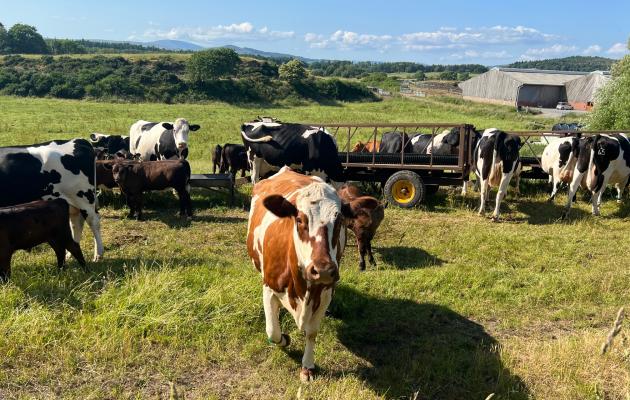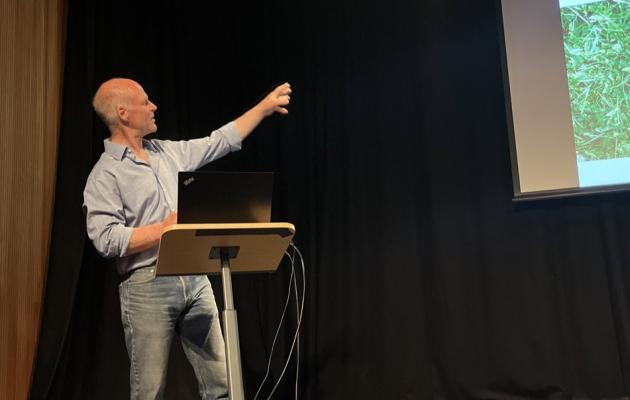I’m continuing to write this blog as I travel to London to an Ellen Macarthur Foundation Climate Action Summit which is showcasing our cheese, straight from a mini conference in Edinburgh organised by the Nature Friendly Farming Network featuring Rethinking the (broken) Food System. I can’t help getting a sense of déjà vu.
These regenerative agriculture / agroecological / food community discussions are the same discussions we were having 25 years ago, sure, much has changed, but at a glacial pace.
Most folk now know there are problems and want them sorted, but they want them sorted without having to suffer any kind of disruption to their lifestyles or business profitability. Our political leaders know this and realise that as this is wholly unrealistic within the political cycle, they can just kick that can further down the road for someone else to deal with. This means there is no leadership at a time when we desperately need it. How can we square that circle?
The Nature Friendly Farming Network conference featured an excellent line-up of speakers, one of which was the charismatic Dane, Mads Fischer-Moller. His message came from the Danish experience of addressing these very issues.
Our public procurement system isn’t designed to deliver the impacts that the government says it wants.
Farmers are being asked to deliver a plethora of public benefits alongside food production. However, the public purse is only sourcing the cheapest. Which means, almost by design, it will exclude goods produced to high environmental and social (ESG) standards. This feeds back to the farmers who wonder where the market is for their high ESG goods? Right now, there really isn’t one. So why bother? It’s a downward spiral.
In Denmark, despite initial widespread resistance, the public sector was funded to create that market for high ESG goods. Very soon the private sector stepped up. Now 30% of the land in Denmark is farmed organically and up to 80% of some commodities purchased in Denmark are organic.
Another inspirational speaker was Robin Gourlay, champion of the forward thinking East Ayrshire Council’s local food for schools programme. A pilot for Scotland? Well perhaps. But not the way things stand.
The big plus in Robin’s system was guaranteed payment, but the minuses were the horrendous bureaucracy and a supply infrastructure that only favoured big players. With a bit of political will and vision this could be transformed.
The public procurement bill for food in Scotland is £160m. What if we transitioned the public sector to 100% high ESG food over a 10-year period? The premium over the basic market price for suppliers meeting the high standards might be 50% higher. This would be a sufficient premium to incentivise farmers and growers to meet these standards.
What might that cost? Well, if it is, say, 10% in the first year and a 50% premium that would come to about £8m. But in addition, the access to the public sector must be streamlined bureaucratically and physically. Delivery/collection centres, sorting, testing and distribution infrastructure needs to be put in place. Producers at all scales need assistance to transition their businesses - not grants, but soft loans based on sound business plans.
Where is this money coming from? Half a billion comes into the rural economy in Scotland based on how big the farm is. This is just a waste of taxpayers’ money.
What if we used a chunk of that half a billion to educate school kids about the value and preparation of quality food and also deliver that quality food to our children, the sick and aged and our prisoners through changes to procurement priorities.
It would incentivise good social, environmental and welfare practices on any scale of farm by creating a powerful market reward. It would create the political and economic environment which would de-risk the market and motivate business to move in.
It would be transformative.
Just a pipe dream? Maybe. But it is a plan. Right now we just have a mess.

Postscript. At the Ellen Macarthur summit in London there were 300 business delegates seated round the central stage in the Roundhouse Conference Centre. We were asked to hold up one of two coloured cards in response to three questions posed by the compere. I can’t remember the first two questions which received pretty even responses, but the third was very interesting.
The question was, ‘What do you believe is the best way to achieve our net zero targets?’ The options were, 1. Through market forces or, 2. Through legislation. Remember these were all businesspeople.
Over 99% voted for option 2. Through legislation. This pretty well summed up all the indicators I have been seeing in recent months. In terms of climate change, biodiversity loss and the rest, until government take a proactive lead, nothing is going to change.


